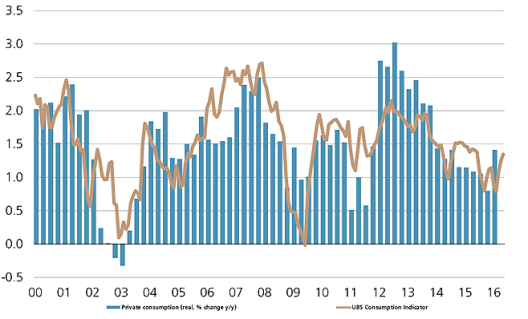The UBS Consumption Indicator rose to 1.35 points in May from 1.24, extending its positive month-on-month run. The indicator was, however, adversely affected by the recently released employment figures for 1Q 2016. Zurich, 29 June 2016 – The UBS Consumption Indicator’s rise to 1.35 in May from 1.24 points represents a month-on-month improvement, albeit one measured from a lower level. The April figures were revised down to 1.24 points from 1.47 points, in response to weaker than expected employment figures in the first quarter of 2016. This represented the first decline in employment since 2010 (–0.2 percent year-on-year). Most of the decrease was attributable to lower employment in the industrial sector. Employment increased slightly in the service industry, however. Private consumption sent a positive signal, increasing 2.8 percent on an annualized basis in the first quarter. It thus expanded much faster than in the previous quarter, and supported Swiss economic growth. Private consumption should remain a pillar of Swiss growth for the remainder of the year, but appears unlikely to repeat its first quarter performance.
Topics:
UBS Switzerland AG considers the following as important: Featured, newsletter, Swiss Macro
This could be interesting, too:
Nachrichten Ticker - www.finanzen.ch writes Die Performance der Kryptowährungen in KW 9: Das hat sich bei Bitcoin, Ether & Co. getan
Nachrichten Ticker - www.finanzen.ch writes Wer verbirgt sich hinter der Ethereum-Technologie?
Martin Hartmann writes Eine Analyse nach den Lehren von Milton Friedman
Marc Chandler writes March 2025 Monthly
The UBS Consumption Indicator rose to 1.35 points in May from 1.24, extending its positive month-on-month run. The indicator was, however, adversely affected by the recently released employment figures for 1Q 2016.
Zurich, 29 June 2016 – The UBS Consumption Indicator’s rise to 1.35 in May from 1.24 points represents a month-on-month improvement, albeit one measured from a lower level. The April figures were revised down to 1.24 points from 1.47 points, in response to weaker than expected employment figures in the first quarter of 2016. This represented the first decline in employment since 2010 (–0.2 percent year-on-year). Most of the decrease was attributable to lower employment in the industrial sector. Employment increased slightly in the service industry, however.
|
Private consumption sent a positive signal, increasing 2.8 percent on an annualized basis in the first quarter. It thus expanded much faster than in the previous quarter, and supported Swiss economic growth. Private consumption should remain a pillar of Swiss growth for the remainder of the year, but appears unlikely to repeat its first quarter performance. A more dynamic development will probably be held back by sluggish employment growth, declining immigration and rather pessimistic consumer sentiment, as indicated by surveys conducted by the State Secretariat for Economic Affairs. |

